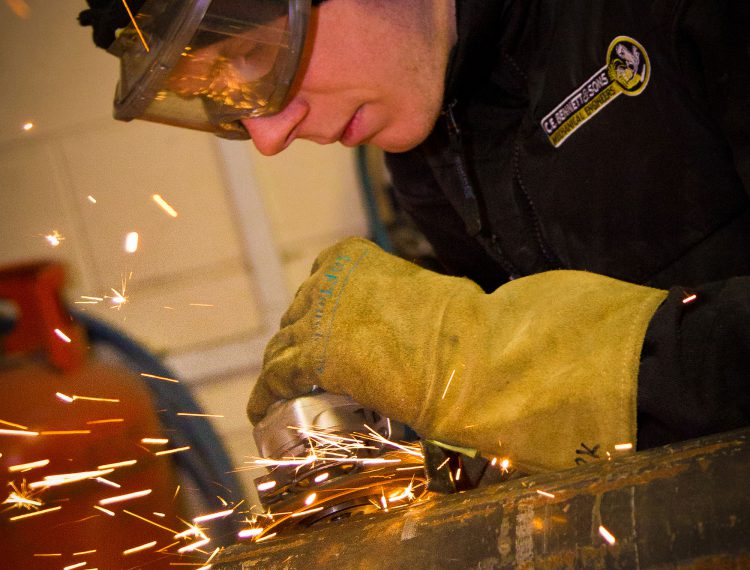Why it’s important to hire a certified welder?
Having a basic understanding of fabrication and welding ensures that you make the right decision when selecting a certified welder to undertake your project.

Whether you want someone to install process and mechanical pipework systems or if you want to outsource an entire maintenance service, it’s important to understand the basics so you can find the right person or company for the job.
What is fabrication?
Fabrication is the process of constructing products by combining parts together, typically by welding metal structures together. For example, steel fabrication is the process of cutting, bending, assembling, and welding metal structures to complete an assembly by combining sub-assemblies.
Computer-aided designs (CAD) are often used in order to help with this process. They are programmed using computer numerical control (CNC). Using CAD and CNC allows you to communicate directly with the machinery on the factory floor which leads to higher quality and an increase in assembly.
Using these technologies and having an expert in fabrication allows you to work faster which is essential for high volume production and also reduces the overall cost by providing better material utilisation and faster assembly times.
What’s the difference between fabrication and manufacturing?
Fabrication is the process of joining materials together in a process called welding, whereas manufacturing is the process of converting raw materials into a finished product. Fabrication is used in the manufacturing process to lead to the finished product.
What services can a welder provide?
C.E. Bennett & Sons offers in-house and on-site welding services to suit all customer requirements. Our highly skilled, coded welders have a wealth of experience in handling all types of fabrication across a range of materials including; stainless steel, carbon steel, and exotic metals.
There are various different types of welding available:
- Metal Inert Gas welding (MIG welding) is where a continuous metal wire is fed into the point that the two pieces are being joined together.
- Tungsten Inert Gas welding (TIG welding) uses inert gas (i.e. helium or argon) generating heat via an electric arc between a non-consumable tungsten electrode and the metal.
- Robotic welding (also known as automated welding) is done by an automated system or robot using controllers and sensors.
- Aluminium welding has a much lower melting point than steel and is a delicate process usually carried out with TIG welding.
With the development of modern technology, there are now several different types of tools that can now be used for welding. Traditionally, welding consisted of fire used to produce the heat and pressure needed to combine the two pieces of metal. Now, lasers are becoming a popular tool used to weld Electronic beams are also being used to combine the two materials.
One of the services that are offered through welding companies is engineered repairs and maintenance. Through this service, corrosion resistance can be created as well as pressure boundary restoration and life extension.
Why is it important to hire a certified welder?
With plenty of choices out there, it is important to make the right decision as to who to hire to complete the job.
Here at C. E. Bennetts & Sons, we pride ourselves on the quality of our service. We carry out fabrication work for many of the UK’s leading industries to extremely high specification and exacting standards. We can also offer maintenance services that deliver a range of benefits including streamlined operation, reduced overheads, and the peace of mind of no longer having to recruit and train in-house maintenance personnel. You can read more about our services, here.
Our welders are dual-certified to both BS EN 287-1 2011 and ASME IX, providing assured quality and confidence to our clients.
So what does this exactly mean?
A ‘coded welder’ is a term for someone who has passed a number of standards to be certified. These coded welders will possess many skills and will have gained years of experience through working as welders.
Those who have completed welder approval testing to a specification or standard will be accredited with certificates such as the ASME IX. For the UK approvals are conducted to BS EN ISO standards and for the USA they are conducted to the ASME IX and AWS standards.
The National British Standard (BS) and the European British Standard European Standard (BS EN) are common standards that coded welders will meet.
What is the BS EN 287-1 2011?
The BS EN 287-1 is a European Standard that is given to welders who have gained qualifications/skills and experience in the fusion welding of steel. These welders will possess great skills in manually manipulating the electrode/welding torch/welding blowpipe to produce a product.
What is the ASME IX?
The ASME Section IX is a part of the ASME boiler pressure vessel code that contains the rules for qualifying welding procedures and welders. It is also used to qualify welders and procedures for welding to ASME B31.














